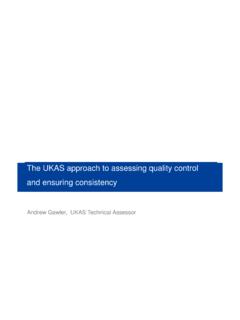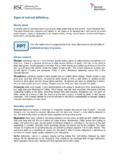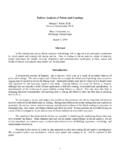Transcription of 4. WHAT CAN YOU BE LIABLE FOR AND WHY? 4.1 Negligence
1 CAN YOU BE LIABLE FOR AND WHY? for Negligence is a civil, not a criminal, matter. It is for the victim to prove thatthe defendant owed them a "duty of care", that that duty was breached, and that theyhave sustained either foreseeable harm or economic loss as a consequence of thenegligence alleged. If successful, the victim will be awarded damages assessed onthe basis of the harm caused or loss practice this means that a water chemist must avoid any act or omission whichwould adversely affect those whom he should reasonably expect could be soaffected. This is a far-reaching example, a water company digging a hole in order to lay pipes beneath apavement should protect the hole against the possibility of not only a normalpedestrian falling into it but also a blind person doing so. Another example isanalysing a sample so poorly that a wrong result is obtained, someone acts inreliance of that result and suffers damage, perhaps by not taking action that wouldotherwise have been mattersAll business relationships involve a mass of contracts.
2 These can include contractsof employment, leases, buying stationery, and of course contracts for professionalservices. Failure to perform a contract can lead to an action for breach of contract. Ifsuccessful, the outcome could be an award of damages and/or an injunction and/oran order for specific performance (an order to perform the contract). It is thereforevery important before entering into any contract to consider the terms of it in detail. Itis no defence to an action for breach of contract to say that you did not read the termsof the aspect of the problem is that the law implies terms into certain types ofcontract and, on the other hand, forbids other types of clauses from being example, in a contract for the supply of services there is an implied term that theservices will be undertaken with reasonable skill and care.
3 An example of an illegalprovision is a term excluding liability for causing personal injury or is also important not to be intimidated because the contract comes as a supposedly"standard" set of terms and conditions printed, for example, on the back of an orderform. It is vital to remember that once you have signed a document that you arecommitted to all the terms of it, subject to the provisos course, the same incident can give rise to an action both for breach of contractand for is important in any dispute. From your own viewpoint, it is important to beable to prove that a client gave you instructions to do the work in question. Thiswould usually be a letter from the client to you, or an order for services to the wrong thingWhen writing reports or other documents, attention must be paid to the possibility ofcausing harm to an entity through either negligent or fraudulent misstatement, ordefamation (libel).
4 More details are given in section below. It should be borne inmind that in defamation trials the burden of proof is reversed, so that the defendanthas to prove that his statement was true. There are some defences available, suchas for the contemporary reporting of court other people's propertyWhile visiting premises for any authorised purpose it is a criminal offence (theft) toremove ANYTHING "dishonestly" (or in a manner that could be so misinterpreted)save in certain circumstances, spoil resulting from diverting a water belong to the person in whose soil they grow. An exception to this are thingsgrowing wild such as fruit, flowers or mushrooms, unless they are to be sold for consent to removing the item or sample is a wise course of action. Seealso section civil right of action would also be relevant under the tort of "conversion of goods".
5 The persons whose goods had been taken could sue for recovery of the goods or thevalue premises or going on to to premises - trespass to landTrespass to land consists of entering on to someone else's land or remaining there orplacing an object on the land. Even persons who have statutory rights of entry willsometimes need to obtain a warrant or court order to enter premises or go on to landbut there are is not, in itself, criminal. There is an assumption of consent to be on theland if a visitor is going up to the front door of the premises, for example, but suchconsent can be revoked verbally. An occupier can ask the trespasser to leave by theshortest route. Refusal to do so, or continuing trespass by way of personal entry orleaving things on the occupier's land do, however, constitute a criminal offence forwhich the trespasser may be Criminal Justice and Public Order Act 1994 introduces the criminal offence ofaggravated trespass.
6 This occurs if a person trespasses on land and does anythingwhich is intended to intimidate, disturb or disrupt people in adjoining land, in whichcase the trespasser can be removed by police. Re-entering the site as a trespasserthen becomes a further rights permitting entry to premisesThe water Resources Act 1991 and the water Industry Act 1991 list a number ofgrounds under which an authorised person (typically an employee of the EnvironmentAgency) may enter any premises or to propertyThe principal criminal offences of damage to property are governed by the CriminalDamage Act 1971. Damage need only be very slight for the Act to apply. Forinstance, crops can be damaged by trampling them down, or fences damaged bydistorting the wire. However, liability will depend on the owner being able to showthat the perpetrator either intended to damage property or else was reckless as towhether damage resulted.
7 Damage resulting from powers of entry granted under theWater Resources Act 1991 will constitute a lawful excuse to a charge of criminaldamage, but it is the duty of the Environment Agency, under the Act, to make fullcompensation to any person who has sustained loss. Similarly, if damage has beendone to gain access to premises, the site must be left as secure as when injured party could also sue in civil law for damage to his - use of land and enjoyment of land - noise, smell and escapingsubstancesIn law, "nuisance" is taken to mean disruption of private rights to the enjoyment ofland. Nuisances are divided into public and nuisancePublic nuisance is one which materially affects the comfort and convenience of life fora significant number of people in the vicinity. Public nuisance is a criminal instance, if work is carried out resulting in obstruction of a public highway andthere was no statutory permission for the work, prosecution may result if sufficientnumbers of people have been inconvenienced by nuisanceA claim for a private nuisance can only be brought by an occupier of the landaffected.
8 Private nuisance is a civil matter. An individual may bring a civil actionwhere the use of his property is continuously or recurrently affected by a"disturbance". This may be a smell, noise or an escape of effluent, for that many nuisances are the result of public bodies acting understatutory powers, this only absolves the relevant body of liability if they can show thatthe nuisance was the inevitable consequence of the work and that the work wascarried out with all reasonable care. Therefore, a water chemist performing arepetitive operation likely to cause a nuisance must be sure that (a) they have thenecessary statutory authority to do so, where relevant, and (b) do so as professionallyas possible and with the minimum disturbance to the leaking of substances on to neighbouring property, for example from a heating oilor fuel oil tank, would constitute nuisance.
9 The owner of the polluted property wouldhave a right to sue the polluter. Nuisance is of wide application in environmental law,not least as no Negligence is required on the part of the offending party and it is thuseasier to nuisance under sections 79 to 83 of the Environmental Protection Act 1990is a simplified procedure for requiring an offending party to cease - that is to "abatethe nuisance". of for dangerous thingsWhere dangerous things are brought onto land, care is required to prevent accidentalescape. In civil law, a person is answerable for all the damage that is theconsequence of the escape. This would include, for example, the consequences offlooding downstream if a dam should give way through poor siting or construction, ordangerous substances escape and cause pollution or is quite distinct from duties under statutory law.
10 The Environmental ProtectionAct 1990 covers liability for the deposit or accumulation of waste on land and theRadioactive Substances Act 1993 addresses liability for radioactive waste located onpremises. Violation of environmental statutes may well result in prosecution ( acriminal offence would have been committed). Also, orders can be made under the1990 Act to require the removal of is legislation concerning the safe storage of flammable substances. Advice onrequirements can be obtained from the Health and Safety of PremisesUnder the Occupiers liability Acts 1957 and 1984, it is an occupier's responsibility toensure that visitors to premises will be reasonably safe in using the premises. Inpractice this means displaying sufficient warning signs, ensuring that premises are insafe repair and, where necessary, accompanying the visitor while they remain on thepremises.
















